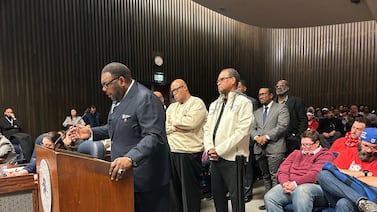When Meighen Lovelace’s daughter was in fifth grade two years ago, her school day started at 10 a.m. and ended at noon.
Lovelace said officials in their rural Colorado school district told them that was the only portion of the school day an aide was available to support the girl in her special education classroom.
Lovelace and her husband reluctantly accepted the two-hour school day.
“They had a kind of a take-it-or-leave-it attitude,” Lovelace said of school officials. “It felt like that was our only choice.”
Now, state lawmakers are considering a bill that would put stricter guardrails on the use of shortened schedules for students with disabilities and collect data on how often those students miss part of the school day because they are sent home early or placed on modified schedules. House Bill 24-1063, titled “Addressing Abbreviated School Days,” aims to better track and define a practice that parents and advocates say is isolating for students and disruptive for families, but often occurs under the radar.
The House Education Committee unanimously approved the bill on Feb. 15. Its next hearing will be in the House Appropriations Committee, but that hearing has not been scheduled.
The bill would require the Colorado Department of Education to create a policy stating when shortened school days are permitted and what information parents must be given. The policy would also require school teams to regularly review such schedules for students with disabilities. Under the bill, the department would also have to provide training to school districts on abbreviated school days.
Starting in 2026, the bill would require the department to publicly post school district data showing the number of students with disabilities who have abbreviated schedules, broken down by race, gender, and English learner status. The bill’s $219,000 price tag would cover the cost of additional staff at the education department.
During public testimony at the Feb. 15 hearing, several advocates for students with disabilities, including Lovelace, said students who are sent home early not only lose out on learning and friendships, but quickly get the message that schools value some students more than others. No one testified against the bill, though educators have said on previous occasions that short staffing and a lack of resources make it hard to serve students with severe needs.
Hanni Raley, executive director of the Arc of Aurora, a group that advocates for people with disabilities, said her organization is working with 30 families whose children face shortened school days. In one case, a single father’s job is at risk because he’s been asked to pick up one child early two days a week because the school can’t manage the child’s behavior. In another, a mother has been asked to keep her child home on days she’s not available to be at school to help the child use the toilet because school staff doesn’t have time to assist the child in the bathroom more than three times a day.
“These abbreviated school days currently go undocumented and unreported,” Raley said. “The burden will solely be felt by the family, and the child will continue to experience negative consequences in their academic, social, and emotional development.”
State Rep. Mary Young, a Greeley Democrat who co-sponsored the bill, said there are some cases where a shortened school day makes sense for students and garners explicit consent from families. For example, she talked about a young girl who was in a car accident in which her mother died. Initially, the girl, who’d suffered a brain injury, was brought back to school on a shortened schedule, slowly transitioning back to a full day as she recovered physically and emotionally.
But Young said there are many instances where shortened days are unplanned and educators simply tell parents to pick up their kids early.
“Parents and guardians should not be cut out of their legal right to make decisions with the special education or 504 team about their child’s education,” she said. “This bill addresses those significant concerns.”
A 504 plan spells out accommodations that students with disabilities are entitled to at school.
Lovelace said she wasn’t happy about her daughter’s short school day in fifth grade, but didn’t want to question school officials.
“They’re the professionals and you believe them because they’re the authority figures,” she said in an interview.
Lovelace said even during the two-hour window when her daughter was in school, officials asked Lovelace to stay in the neighborhood — 45 minutes away from the family’s home — in case they needed her to pick up her daughter early. Lovelace, who declined to identify her daughter’s disability to protect the girl’s privacy, said her employer was understanding, but eventually she lost her job. Today, Lovelace serves as the mental health policy lead at the Colorado Cross-Disability Coalition, a disability rights advocacy group.
The early school pickup had a big impact on Lovelace’s daughter, too — setting her back academically and socially.
“What am I supposed to do? All my friends are in school,” her daughter would say during the long afternoons at home. “There are no kids at the playground, Mom.”
After months of looking, Lovelace found a school in a different district that offered the support her daughter needed to attend school all day. Although it was even farther away, Lovelace said the school’s approach was far more welcoming and positive.
“It was a relief,” she said.
Lovelace said she believes the bill, if passed, will provide more information about which students are affected by shortened school days and why, so that better processes can be put in place to meet their needs.
She also hopes it will remind policymakers that shortened days may send a message to students with disabilities that they don’t belong at school.
“When they’re sent home, that’s what they feel, that’s what they hear,” she said.
Ann Schimke is a senior reporter at Chalkbeat, covering early childhood issues. Contact Ann at aschimke@chalkbeat.org.





